Community
Passion, Mission, Community: Lessons from James Beard's Best New Restaurants of 2022
July 28, 2022
Honoring the first generation of James Beard nominees to open in a post-pandemic world.
They say the best day to start a business is the last day of a recession. You might think, then, that the best day to open a restaurant would be the last day of a global quarantine that kept everyone away from the people and places they loved.
Unfortunately, even as of mid-2022, that final day has not arrived. For restaurants during the COVID-19 pandemic, there would be no clear-cut green light. There would be nothing clear, at all, in any corner of the hospitality world.
The opening years of this decade have been the most trying in living memory for US restaurants. Staying in business has been challenging even for established operators. To open a new restaurant in such an environment was absurd. But restaurant people tend to be absurd. Especially those driven by an inner passion — a personal vision — rather than dollars or accolades.

BentoBox was honored to sponsor the 2022 James Beard Award for Best New Restaurant, given on June 13, 2022 in Chicago.
In the best of times, the James Beard Foundation’s award for Best New Restaurant honors the establishments that, within the past year, have embodied excellence in opening their doors and finding a community. This year, the award takes on even more meaning.
As part of BentoBox’s sponsorship of the 2022 James Beard Award for Best New Restaurant, we got to meet the people behind three of the nominee restaurants: Oyster Oyster (Washington, DC), BARDA (Detroit) and the category winner, Owamni (Minneapolis).
All of them shared a singular passion that never let them waver from the paths they had chosen. Here’s how, against all odds (and probably a few earfuls of advice), these restaurants fought their way into existence, success and eventually, recognition.

RESOURCE
How to Open a Restaurant [Free Guide]
A step-by-step guide to planning, financing, staffing, stocking and marketing a new restaurant for its debut.
Clear visions in a hazy future
When chef Javier Bardauil picked up the phone in Buenos Aires in October 2018, he had an idea what his friend Ignacio Gerson wanted to talk about.
“This dream started when we were living in Miami at the same time,” Gerson recalls today. For years, the two friends discussed opening up a restaurant together. Bardauil had returned to Argentina to start a family, but Gerson had kept his eyes open for the right opportunity.
When the call came, years later, Gerson’s pitch was simple: He had relocated to Detroit and discovered that the resurgent city needed an authentic, wood-fired Argentinian restaurant. Chef Bardauil, trained in Europe, Argentina and the US, would put his own stamp on the cuisine.
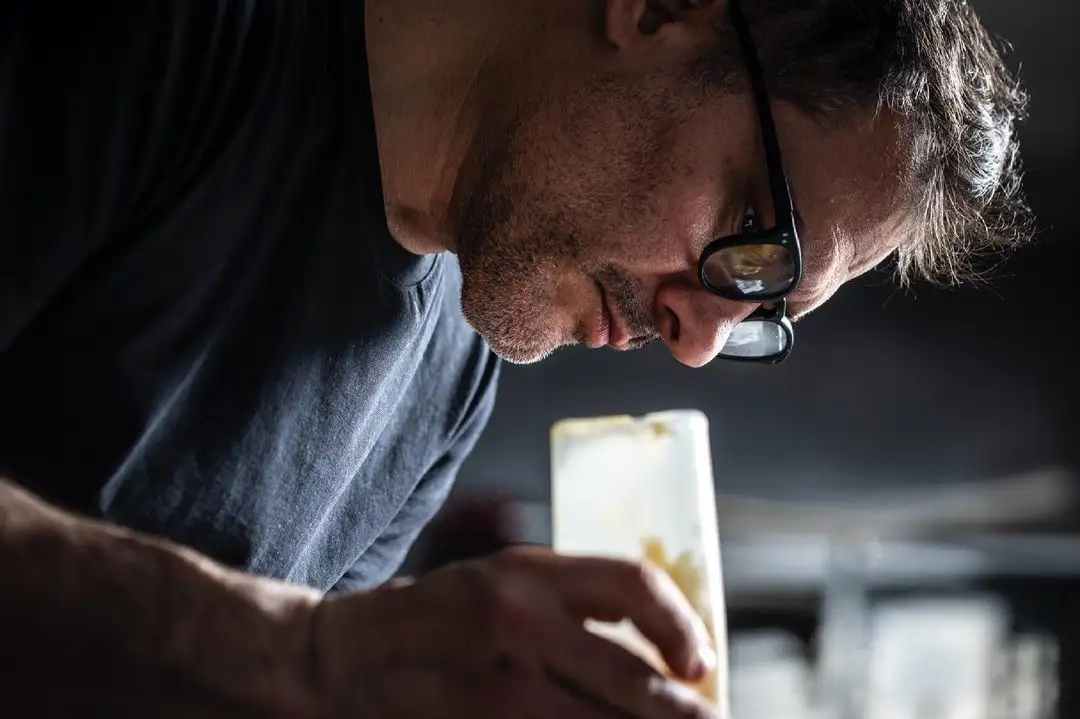
Chef Javier Bardauil
“This is very personal. It’s a restaurant I was imagining for so long,” Bardauil says of the project that would become BARDA. “This restaurant is like an embassy. The cooking, the lights, the music — everything is very aligned with what’s going on in Buenos Aires right now.”
In March 2020, however, it wasn’t anything. Bardauil had moved his entire family from Argentina to Detroit only five months before. He and Gerson were still in the process of looking for locations when the world shut down. “I was miserable,” he laughs now. “It was a moment of tension, for sure.”
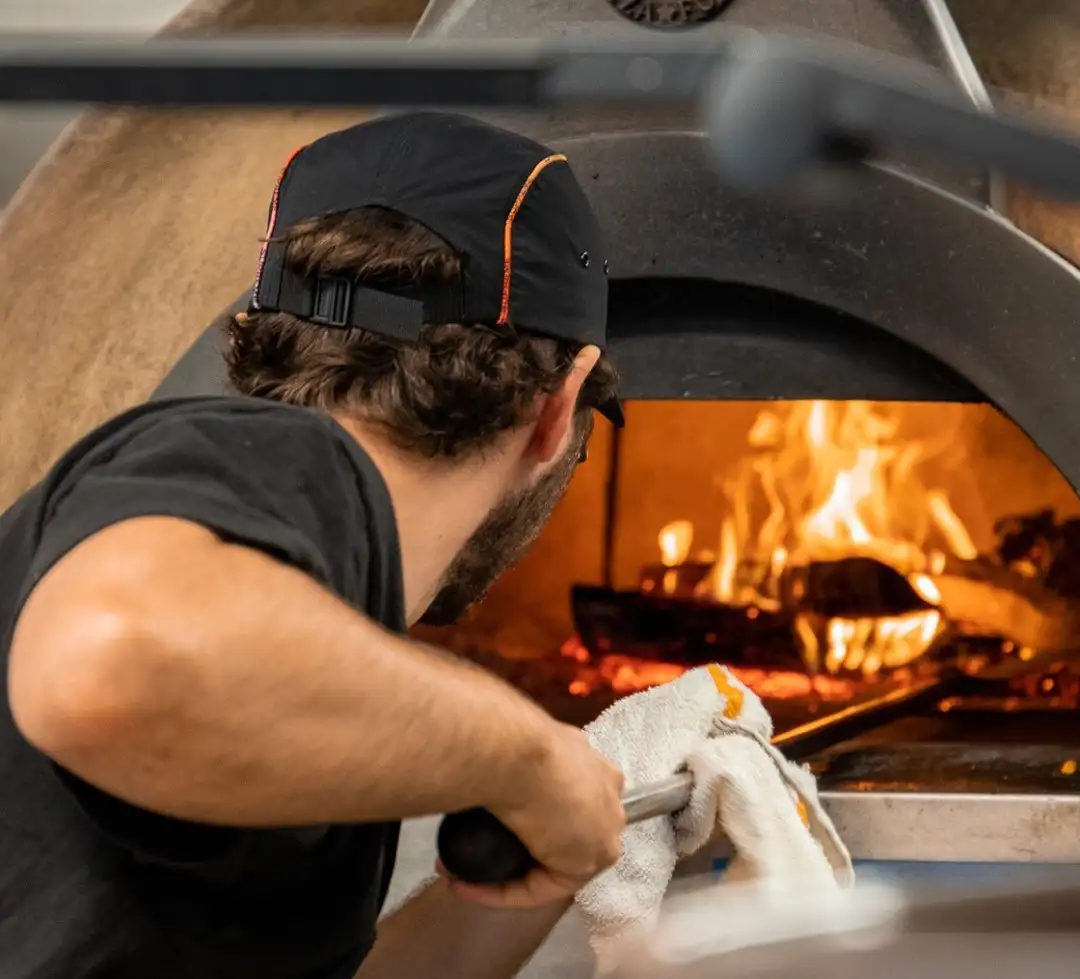
Open-fire cooking is key to BARDA's distinctly South American cuisine.
Unable to get work due to his visa status and with travel all but shut down, Bardauil was forced to live off the capital he and Gerson had raised for the restaurant. Not only was Bardauil’s family dealing with the shock of COVID, but they had young children in a new place where no one knew them. The two men faced a do-or-die choice: abandon the project or figure out a way to make it happen.
With everything to lose and everything to gain, Bardauil doubled down on building a name for himself in Detroit. He started producing pop-ups around town, and instantly, reservations began selling out — affirming to the two friends that they had a good idea on their hands. In retrospect, he credits the fact that they stuck to the original vision with his ability to forge ahead.
“Oh, things got desperate. I remember talking with Ignacio about turning the restaurant into Italian,” Bardauil says. “I was so scared of not being successful. The chance to have a second chance was none. But I give a lot of credit to the fact that we stuck to the original idea: bringing real Argentinian cuisine to Detroit.”
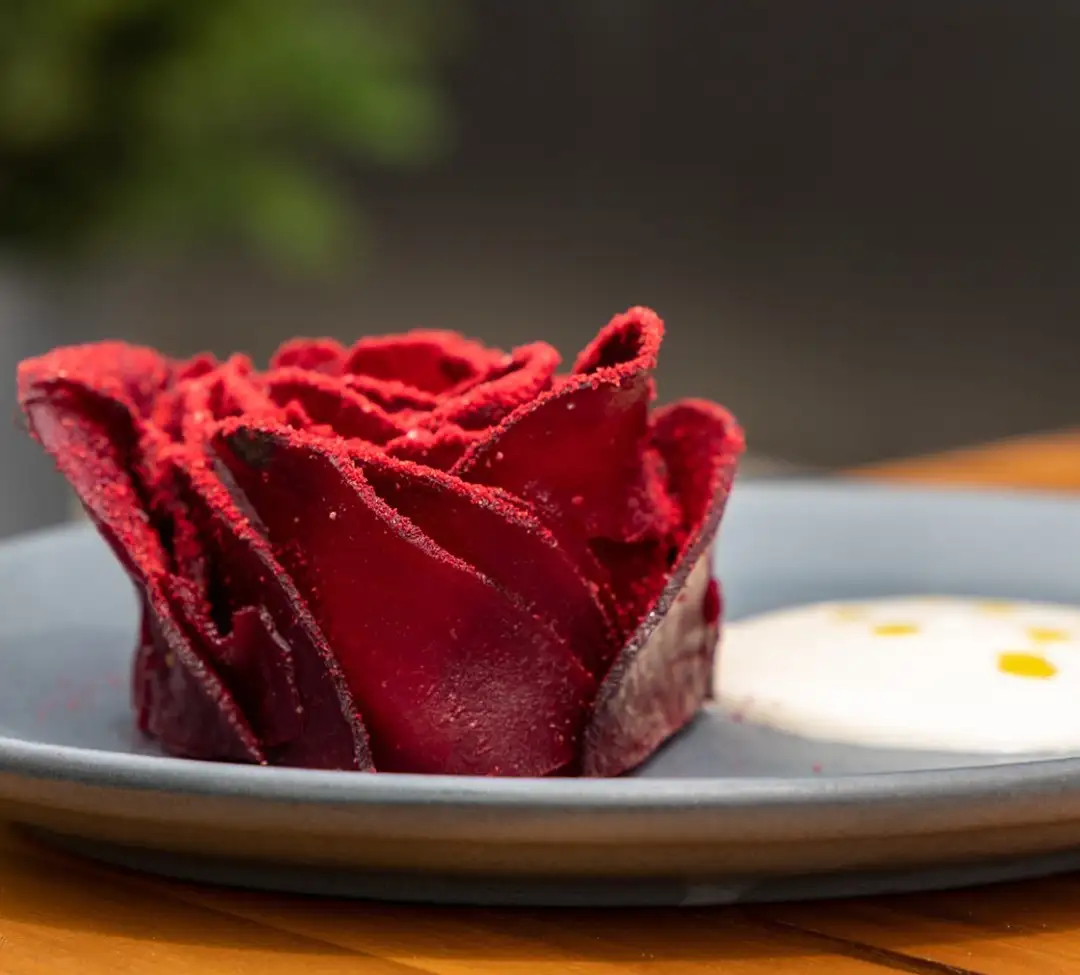
BARDA's signature Glazed Beets were inspired by Chef Bardauil wanting to transform Detroit Dark Red heirloom beets into a symbol of the city's "blooming."
Sticking to the original idea was a theme echoed by all the Best New Restaurant nominees. When nothing in the world is clear, a clear vision is the only thing to hang onto. It’s how Chef Rob Rubba of Oyster Oyster was able to work long, lonely hours in the kitchen by himself, and how the staff at Minneapolis’s Owamni was able to continue building out a restaurant in uncertain circumstances.
For Bardauil and Gerson, trusting their vision was how they kept the dream alive until a perfect wood-fired restaurant space fortuitously became available. A few months later, on June 10, 2021, BARDA opened its doors and hasn’t looked back.
Support from beyond the restaurant walls
Peer out the windows of Minneapolis’s Owamni and in the middle of the Mississippi River you’ll see Saint Anthony Falls, the only natural waterfall on the upper river. Ask any of the servers what they call it, and you’ll learn that long before any European laid eyes on the waterfall, it was one of the region’s most sacred spaces for the Eastern Sioux. One of those Sioux tribes, the Dakota, called it Owámniyomni, meaning “eddy or whirlpool.”
To co-founders Dana Thompson and Sean Sherman, discovering that their restaurant didn’t need to invent a name, but only reclaim one from antiquity, was perfect. Owamni is the first restaurant opened under the banner of Sherman’s The Sioux Chef, which itself is less a hospitality brand than a multidisciplinary campaign to revive the area’s indigenous cuisine. The Sioux Chef’s massive undertaking encompasses culinary, linguistic and anthropological research, just for starters.
“We call it putting a broken pot back together,” Thompson says.
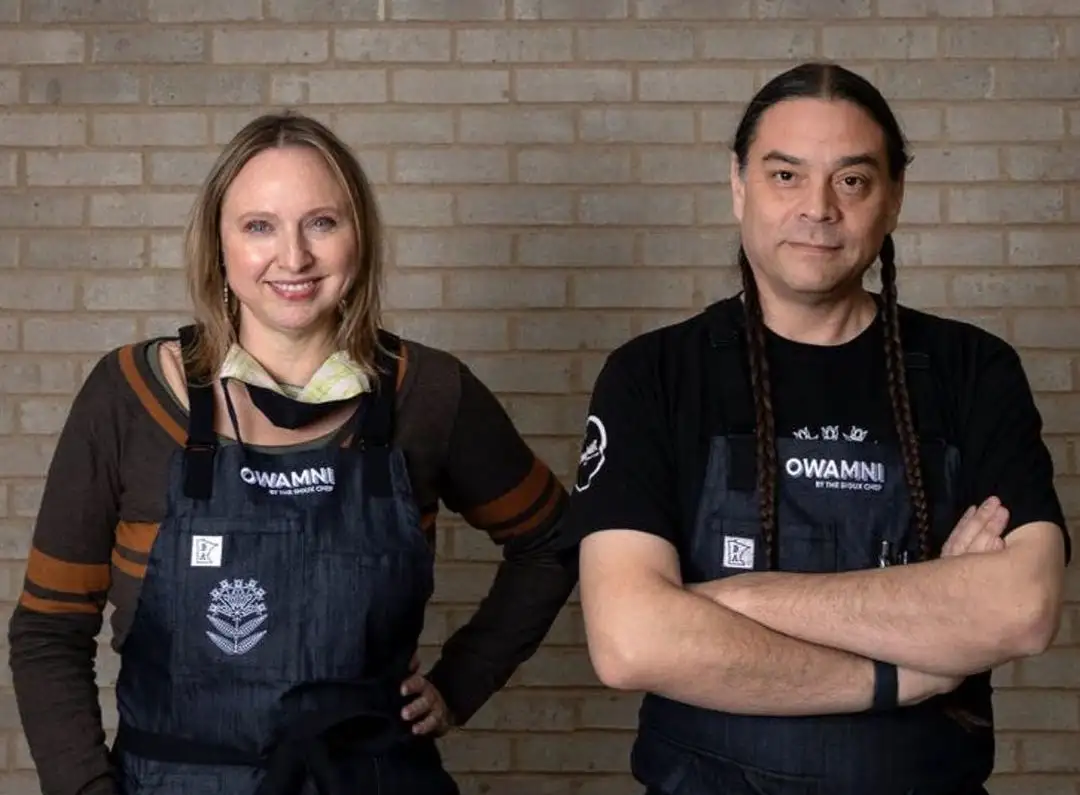
Dana Thompson and Chef Sean Sherman
The vast scope of The Sioux Chef’s mission means that Owamni sits at the center of one of the most ambitious cultural projects in North America. The restaurant is that project’s living welcome center, and as a showcase of Chef Sherman’s neo-indigenous cooking, its culmination. Every detail of the restaurant is designed to welcome guests into a space of living indigenous culture, from the dining room design to the menu, which features exclusively pre-colonial ingredients. (No sugar, wheat flour or dairy.)
“It’s an act of resistance that we even exist,” says Thompson, who is a lineal descendent of the Wahpeton-Sisseton and Mdewakanton Dakota. “I wanted people, especially indigenous people, to come in and experience something that embodies dignity, beauty and comfort.” Guests, says Thompson, are often overwhelmed.
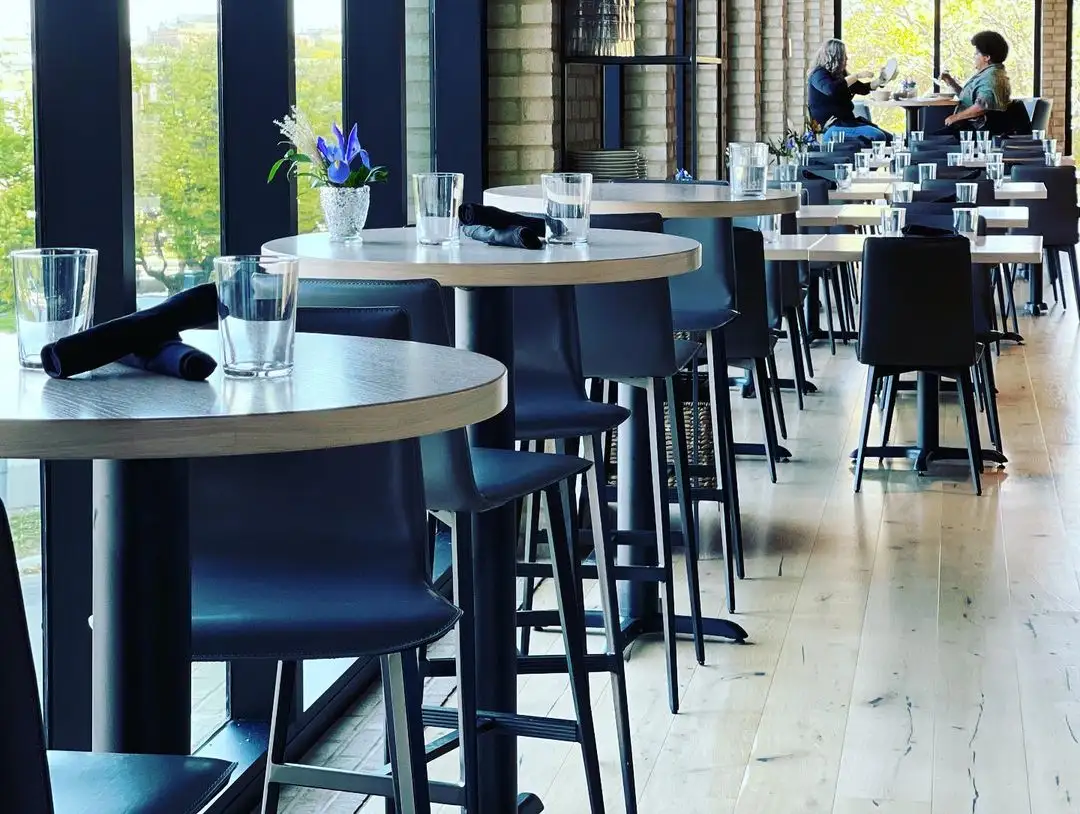
Owamni’s dining room was designed to convey "dignity, beauty and comfort."
It was the guests that brought Owamni into existence. In 2016, when Thompson and Sherman decided to open a restaurant, they created a Kickstarter campaign with a target of $100,000 — an amount that looks hilariously small in retrospect, Thompson admits. But the campaign succeeded in a more important way.
“We raised $150,000, which ended up about half that after expenses and fees,” she recalls. “But what we gained was proof that we had a community. Our project had the most backers of any restaurant campaign in Kickstarter history.”

St. Anthony Falls, or Owámniyomni in Dakota, is one of the most sacred sites for the Eastern Sioux. Today, it stands next to its namesake restaurant.
With more than 2,300 donations, the campaign caught the attention of the Minneapolis Parks & Recreation Board, which invited The Sioux Chef to become the flagship tenant of a restaurant at the center of a $24 million construction project on the banks of the river.
It was during that buildout, already protracted by the archaeological dig taking place on the site, that COVID hit. The staff couldn’t get into the kitchen for a full year. But as soon as the dining room opened in July 2021, the restaurant was a smash.
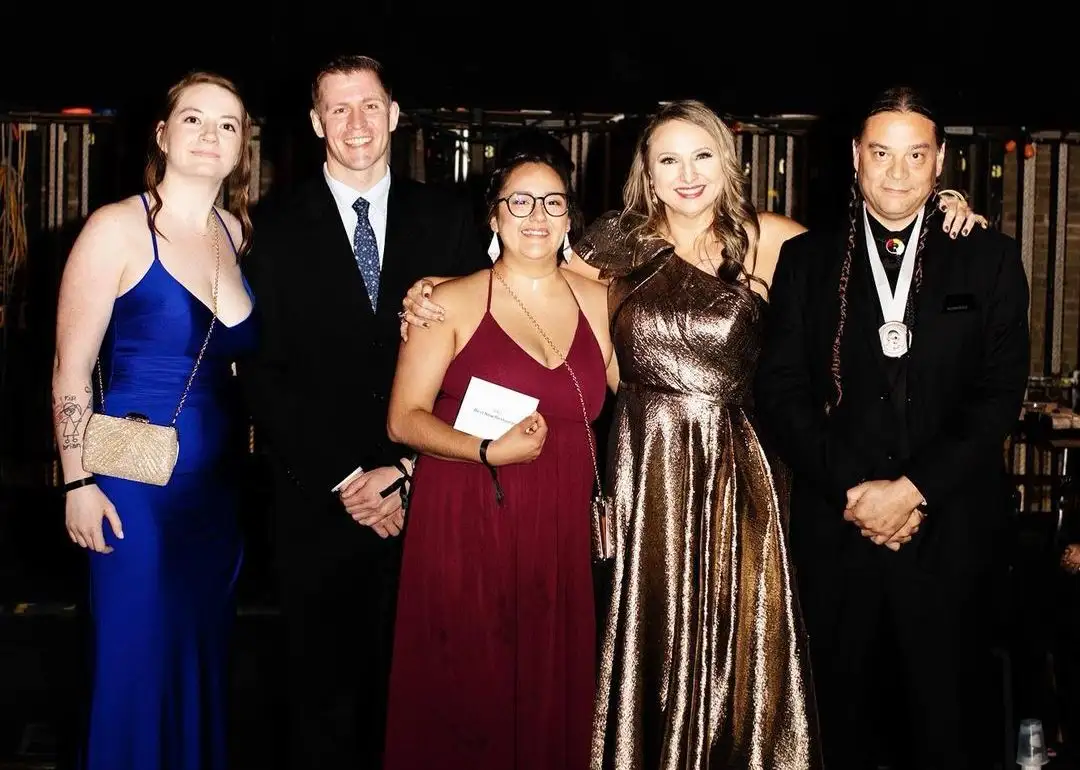
The Owamni team after winning Best New Restaurant at the 2022 James Beard Awards.
Community support is essential to every restaurant that opens to a rave first year. In Detroit, Chef Bardauil built up a fanbase with his pop-ups throughout a harrowing 2020. In Washington, DC, Chef Rob Rubba parlayed a buzzworthy name from a previous project into a level of industry attention that, in the darkest days of the pandemic, likely saved his fledgling restaurant.
Doing whatever it takes
In the first few weeks of 2020, Rob Rubba was about to enter a new phase in his life. Rubba had been cooking in restaurants for the better part of twenty years, working in multiple Michelin-starred kitchens and moving between most of the great restaurant cities in America. Now, as the calendar turned from February to March, he was putting the finishing touches on the project his whole career had been leading up to.
The restaurant would be his first opening as a chef with full control, and the riskiest leap of his life. But it also embodied his entire ethic as a chef. It was the closest thing to a calling he had ever felt.
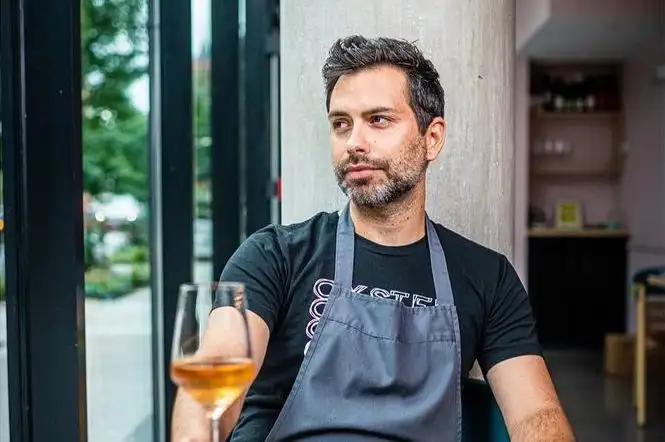
Chef Rob Rubba
Five years prior, Rubba had splashed onto the DC scene as the founding chef of Hazel, Neighborhood Restaurant Group’s Asian concept. The restaurant was an instant hit, garnering accolades from all directions. But it was in that kitchen, mulling over his most popular creation, where a bolt of inspiration changed Rubba’s life.
“We had these sticky, crunchy pork ribs,” he recalls. “They were ridiculous. Very labor-intensive. And of course, every table got an order. One day I started doing the math. And I’m like… that’s a lot of pigs. You know? That’s scary.”
Rubba was trying to work with local farms, but the farms couldn’t keep up with the restaurant’s demand. When he started considering the impact of every restaurant using the same suppliers he was forced to use, an ominous realization struck him: the entire food system he had trained in was not sustainable.
“Right there, I went cold-turkey vegetarian” he says. “In that moment. I just didn’t want to play that game anymore.”
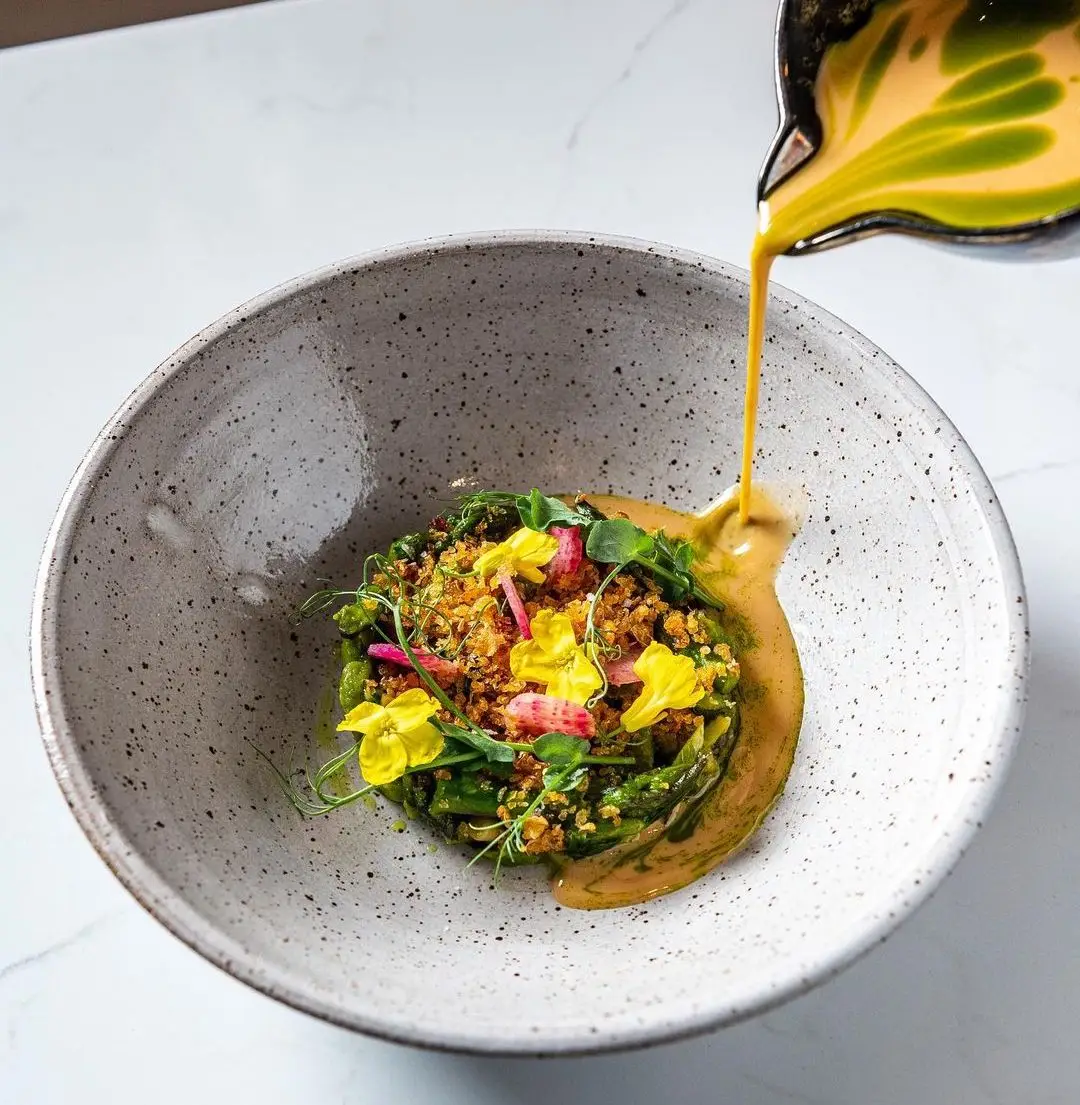
Oyster Oyster's asparagus: Roasted Asparagus, ramps, crispy potato, radish and a Virginia peanut broth infused with Thai basil oil.
It was the middle of 2016. For the next two years, Chef Rubba ran his acclaimed restaurant feeling increasingly distant from the spirit of what he was making and what he was doing. In 2018, he stepped away from the restaurant and considered ending his career as a chef. Soon, however, he realized that his grievances with the business actually pointed his way forward within it.
Rubba envisioned a restaurant with sustainability at its core. An exciting, plant-based menu that featured produce from local farmers and was served by a healthy, supported staff. A business that let him support “winemakers, farmers and producers who also consider themselves stewards of the land,” as he put it.
Oyster Oyster’s development was in its final stages when the calendar turned to March 2020. Overnight, Rubba found himself in territory that even an illustrious career in some of the world’s best restaurants didn’t prepare him for.
“We had made promises to some people for jobs already, and then reality set in,” Rubba recalls. “I set up a bagel pop-up just to make some money and keep my head in the game.” He sent his people odd amounts of cash on Venmo as it came in from the pop-up, just to keep his staff close by. “And unfortunately, since we weren't established yet, it wasn't like they could collect unemployment from us.” It was rough.
As soon as Rubba was able to start cooking in the restaurant — he conducted a health inspection of his new kitchen via Zoom — he faced the new problem of getting his food ready for takeout.
“Here we are, a plant-based tasting menu restaurant dedicated to sustainability. So how the hell are we going to do all this packaging? We started out with our three-course meal in compostable containers. Eventually we realized we weren’t just doing it for a few weeks, so we switched to, basically, comfort food: mushroom cheese steaks and different kinds of pizzas and playing around with that. We just went with every angle we could.”
Rubba was often the only cook inside of Oyster Oyster, preparing orders as they came in and trying to stay in touch with the outside world. The isolation and the need to reimagine his revolutionary concept became an extended, involuntary meditation on his craft.
“Cooking alone made me pull from within and really consider what was important to me. I think a younger version of me would have valued the philosophy of my food over things like comfort and nourishment. Having to make food with comfort front and center, food that creates joy, gave me a new idea of what cooking with soul is really about.”
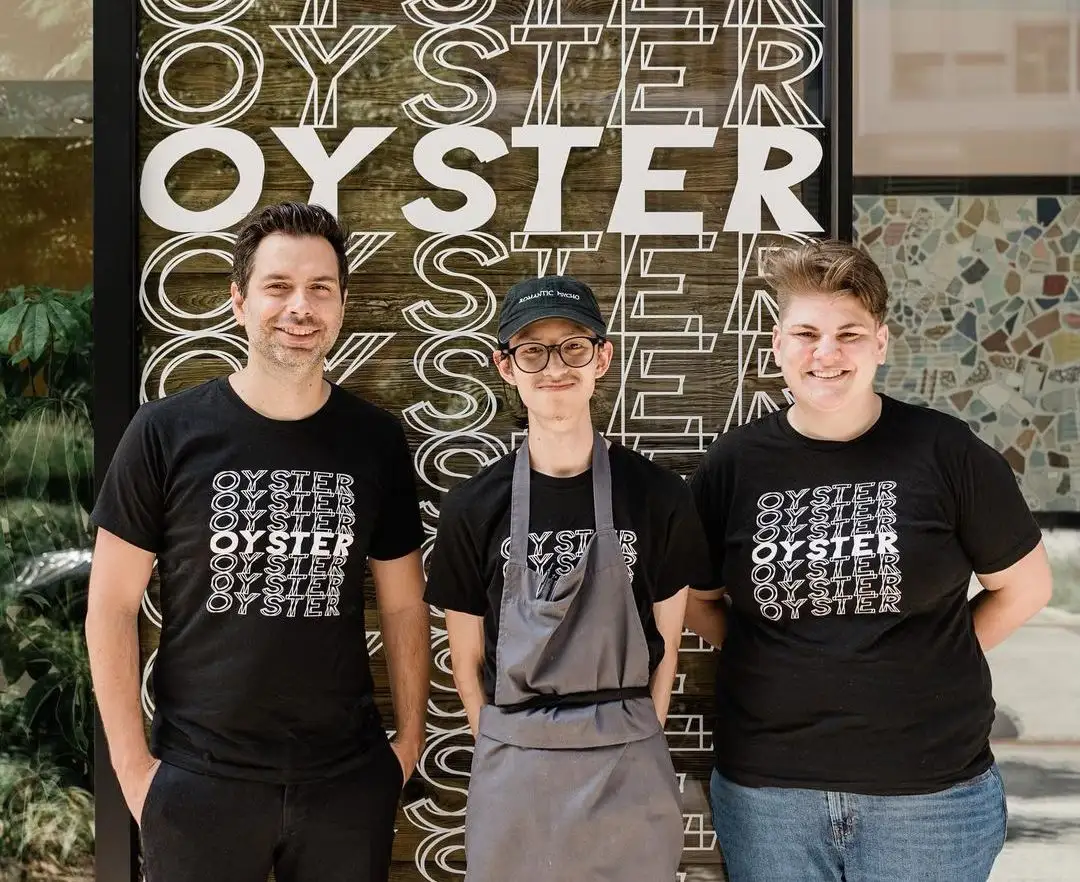
Chef Rubba, sous chef Vincent Ho and cook Liesbeth Workman.
Rubba had also become an expert at using social media to stay in touch with his community. Much like BARDA and Owamni, he found that when his doors finally opened in early 2021, the community he had cultivated was there waiting.
When the crowds and the accolades really started pouring in — Oyster Oyster earned a Michelin star less than a year after its first on-premises service — Chef Rubba was able to look back on his harrowing year with bittersweet pride. Against all odds, he stayed true to his mission. And ultimately, the mission is what he credits for his success.
“I think we're doing something very honest and real, and a lot of people connected with that. There was so much time for reflection during lockdown. I think people are spending money a little more consciously now, and maybe they want something real to grab onto.”
The best way to start a restaurant
When COVID-19 struck, the restaurant business model was already under considerable strain. Restaurants had been struggling in the face of rising costs for years, with some observers concerned that a reckoning was due. And that was before it became illegal to congregate inside.
The restaurants that survived COVID did so by way of emergency improvisation and stomach-clenching creativity. Some operators say they are actually better for it. But the restaurants that had to begin their journeys in the middle of the pandemic, and did it with aplomb, are the businesses that truly point the way forward for the industry.
If the Beard nominees for Best New Restaurant are any indication — and there’s every indication they are — the future of hospitality is going to be built by passionate, mission-first restaurateurs who care about their people, inside and outside the restaurant’s walls.
Image sources:
@barda_detroit, @owamni, @siouxchef, NPS, @robrubba, @oysteroysterdc

BentoBox Marketing & Commerce Platform
Opening a New Restaurant?
Help customers find you. 80% of diners search online before visiting a restaurant.
Recommended
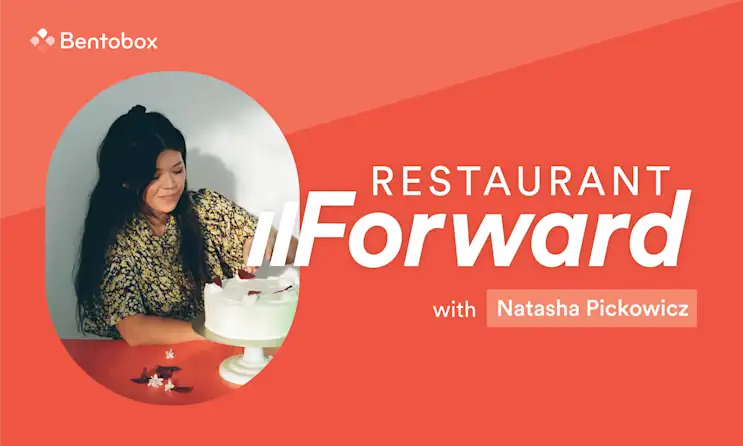
Restaurant Forward
Natasha Pickowicz on Why Restaurants Are Getting Political
July 14, 2022
The pastry chef & activist on why hospitality is finding its voice in a fraught political moment.

Marketing
How to Use TikTok for Restaurant Marketing
June 7, 2022
At first, TikTok may seem too young, fast and confusing for restaurant marketers. But it's worth overcoming those hesitations.

Design Inspiration
Before & After: Restaurant Website Redesigns
January 25, 2022
A sample of last year’s most impressive restaurant website launches — before and after BentoBox.

